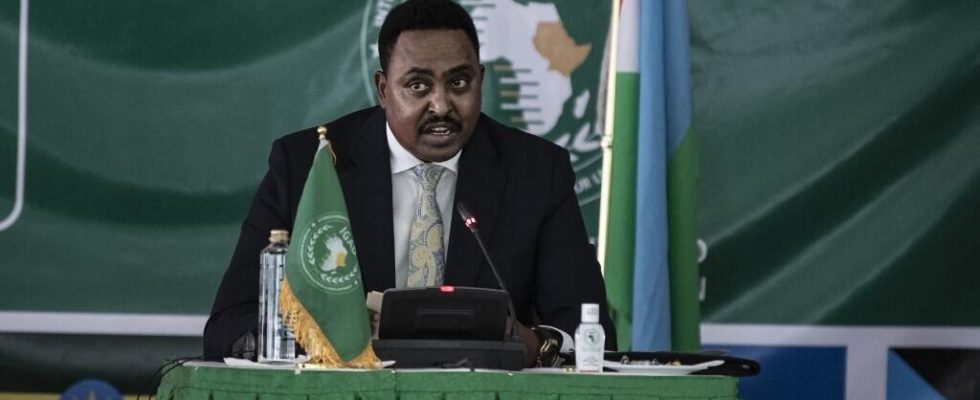The extraordinary Igad summit organized in Uganda ended on Thursday January 18. The Intergovernmental Authority on Development, which brings together seven East African countries, had a busy schedule. On the menu: two major crises. The strong diplomatic tension between Ethiopia and Somalia since Addis Ababa signed an agreement with Somaliland, a self-proclaimed independent territory, which Mogadishu does not recognize. Then, the war in Sudan since April. In the absence of several belligerents, the organization did what it could to regain control
3 mins
It’s difficult to achieve peace when everyone is not at the table. Ethiopia was not present, officially, due to a scheduling conflict. The head of the Sudanese army, General al-Burhan, announced his boycott of the summit, because Igad had invited his sworn enemy, General Hemedti.
Under these conditions, Igad nevertheless did what it could to relaunch peace initiatives. Regarding Sudan, she recalled the commitments and promises of the belligerents, asking them to meet face to face within 14 days. “ Sudan does not belong to the conflicting parties, but to the people », indicated the Member States.
Read alsoSudan ‘freezes’ relations with Igad in diplomatic maneuver, observers say
The Igad secretariat is responsible for revising the road map adopted last June, but not implemented, and establishing a clear timetable so that within a month, a new peace process will be convened, process led by the Sudanese. A very delicate task as the situation on the ground is disastrous and the antagonism between the generals is strong.
“ We describe the war in Sudan as unjust, said Ugandan President Yoweri Museveni. We, freedom fighters, are very attentive to this. When we fought for freedom during the anti-colonial wars, they were just wars, because we were fighting for justice, and it could not be achieved by other means. We therefore really believe that the belligerents must immediately stop fighting. »
AU sets up high-level panel for Sudan
The African Union announced in a press release on Wednesday the establishment of a high-level panel to resolve the crisis in Sudan. It is made up of three eminent African personalities. Chaired by Mohamed Ibn Chambas, high representative of the AU, it brings together the former vice-president of Uganda, Speciosa Indira-Kazibwe, and Francisco Madeira, the former representative of the AU in Somalia.
This high committee for Sudan takes effect immediately to “ silence the guns “. The members of the committee will work with all Sudanese parties » civilian and military, to quickly restore peace and security in Sudan. According to the press release: They will work in coordination with Igad, the UN and the Arab League.
Despite the efforts made by these various regional and international bodies, over the past 10 months, the clashes in Sudan have only worsened. The relationship between Khartoum and Igad has become strained recently and the Jeddah process has come to a standstill. An opportunity for a return from the AU on this file which is subject to strong competition between different mediators.
Last April, just hours after the start of the war, the AU Peace and Security Council decided to send a delegation to Khartoum, but this was prevented for security reasons. The AU had been involved in Sudan since the fall of President al-Bashir in 2019 by being part of the tripartite committee alongside the United Nations and Igad which sought to bring together the civil and military parties. In January 2022, Moussa Faki, the chairperson of the African Union Commission, presented General al Burhan with a plan to emerge from the crisis, but without success.
Igad took the side of Mogadishu
As for the Ethiopia-Somalia tensions, unsurprisingly, Igad took the side of Mogadishu, recalling the “ cardinal principles of sovereignty, unity and territorial integrity ” from the country. “ Any action must respect these principles. Any agreement must be made with Somali consent “, declared the Member States. However, Igad asks both parties to engage in de-escalation and launch a constructive dialogue.
“ We are deeply concerned, underlined Mahmoud Ali Youssouf, Djibouti Minister of Foreign Affairs. We reaffirm as cardinal principles, respect for the sovereignty, unity and territorial integrity of Somalia. Any action, any agreement must be made with Somalia. We therefore ask Ethiopia and Somalia to engage in de-escalation and constructive dialogue. »
This very recent crisis is of particular concern to the United States. On Thursday, their special envoy estimated that it could disrupt the fight against Shebab terrorists. According to Mike Hammer, the Islamists even use theagreement between Addis Ababa and Somaliland to recruit new members.
This afternoon at State House Entebbe, I hosted the 42nd Extraordinary Meeting of the IGAD to deliberate on the disturbing developments between member states of Ethiopia and Somalia against the backdrop of unjust proceedings in Sudan.
While we stand by the cardinal principle of… pic.twitter.com/SvZ8BIDSz3
— Yoweri K Museveni (@KagutaMuseveni) January 18, 2024
Read alsoEast Africa: Ethiopia-Somalia crisis and war in Sudan at the heart of an Igad meeting
